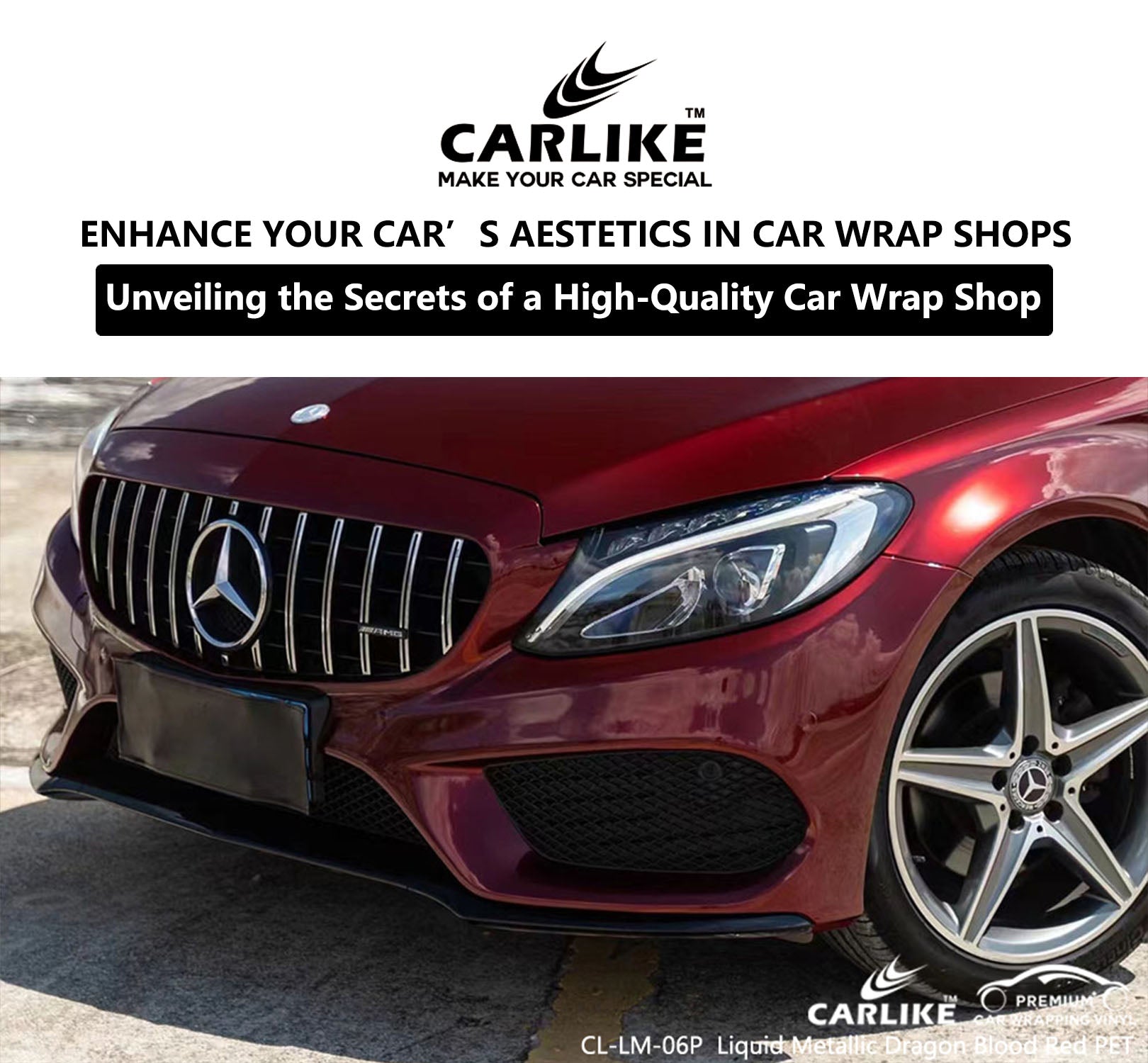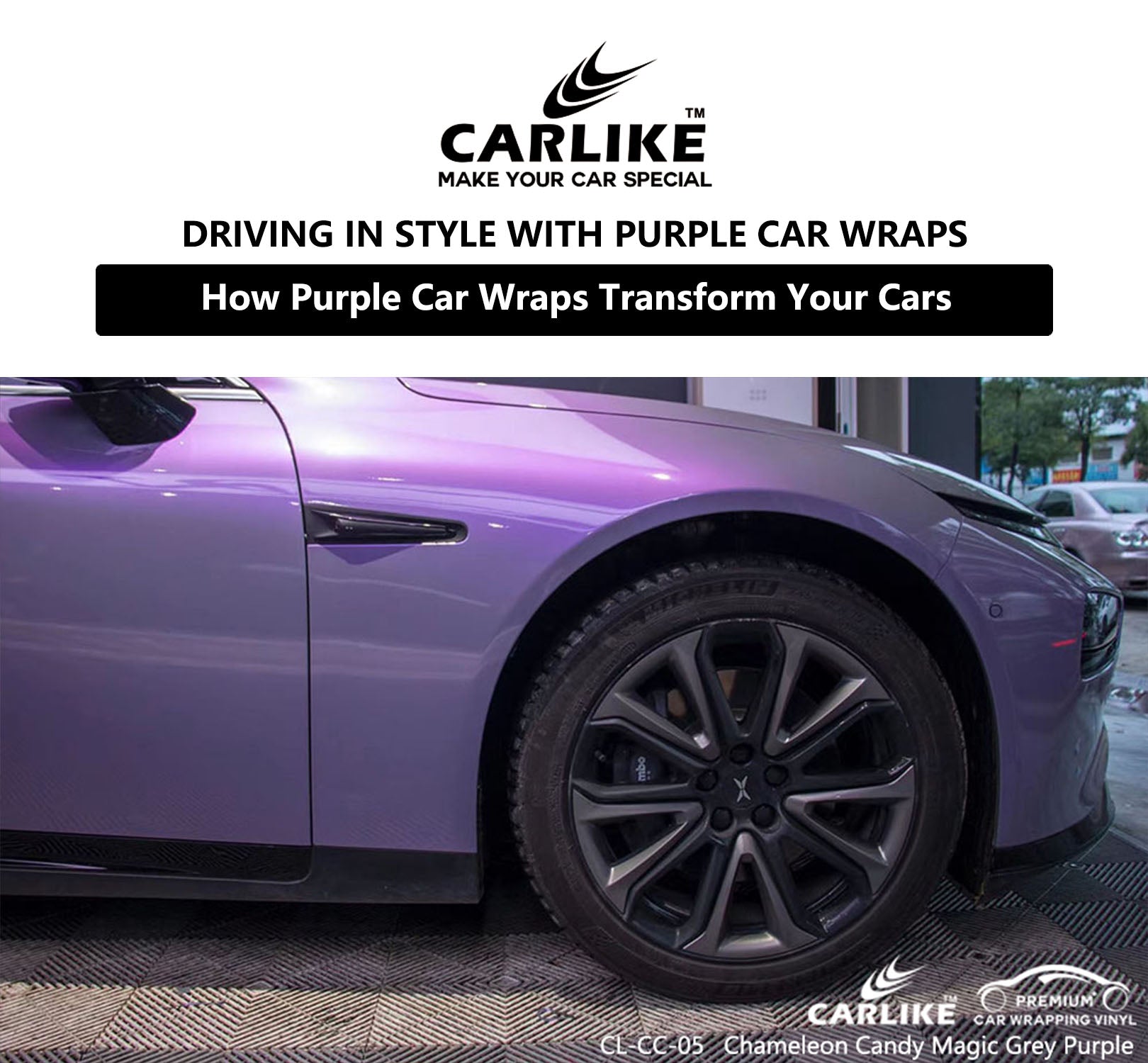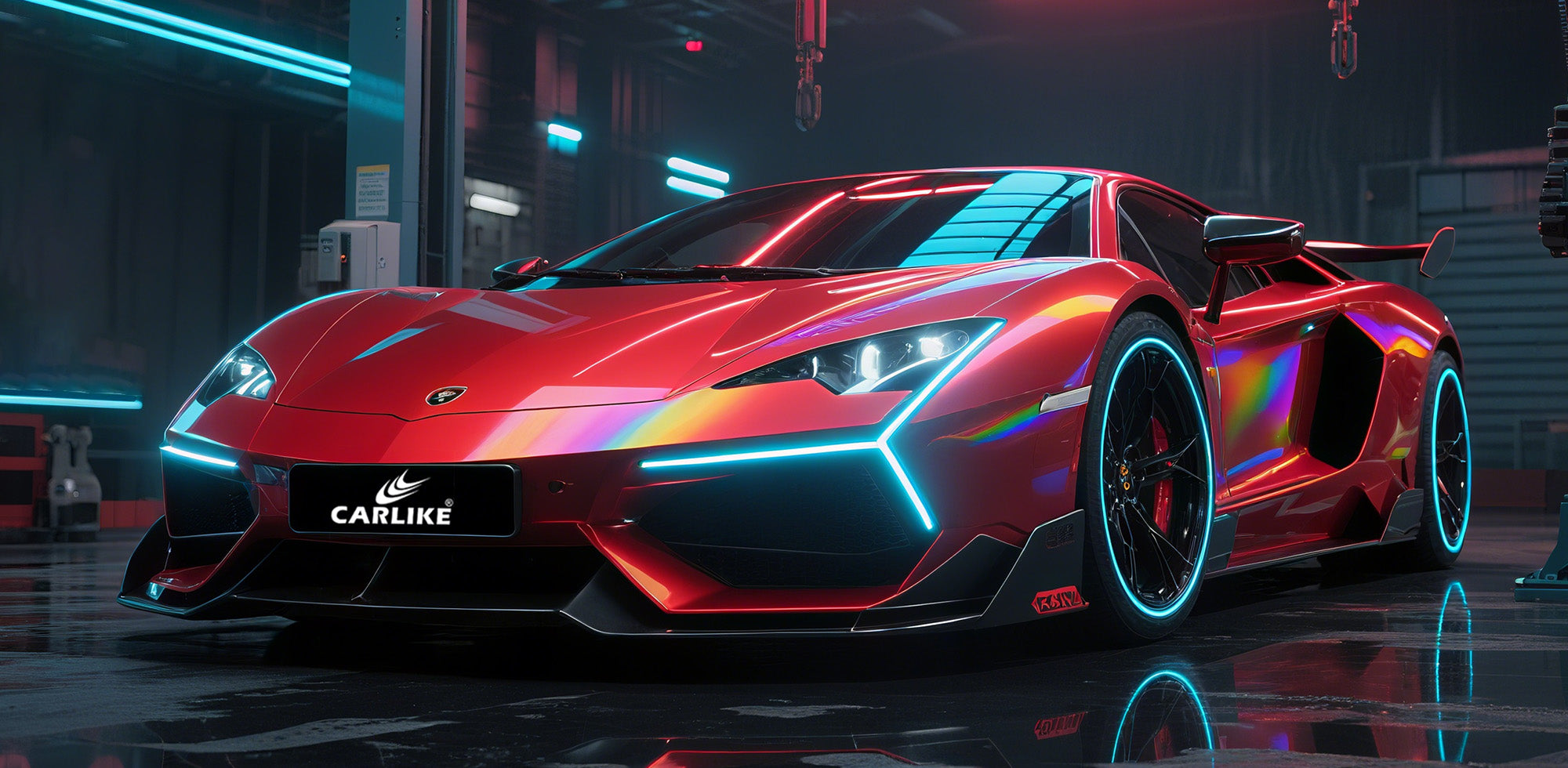Understanding the Different Types of Car Wrap Materials
Car wraps have become increasingly popular as a means of transforming the appearance of vehicles, whether for personal use or as part of a marketing campaign.
These wraps are essentially large vinyl decals that can be applied to the surface of a vehicle, completely changing its color, pattern, or design. However, not all car wraps are created equal, and understanding the different types of car wrap materials available is crucial when it comes to achieving the desired outcome.
1. Vinyl: Vinyl is the most common and widely used material for car wraps. It offers a wide range of options in terms of color, finish, and texture. Vinyl wraps are typically made from polyvinyl chloride (PVC) and can be digitally printed on or come in pre-colored sheets. They are known for their durability, UV resistance, and ability to conform to the contours of the vehicle.
2. Cast Vinyl: Cast vinyl is a high-quality, premium-grade vinyl material. It is manufactured using a casting process, which produces a thinner and more conformable material compared to other types of vinyl. Cast vinyl wraps are known for their excellent longevity, color retention, and ability to withstand harsh weather conditions. They are often the preferred choice for long-term or full vehicle wraps.
3. Calendered Vinyl: Calendered vinyl is a more economical option compared to cast vinyl. It is produced by the calendering process, which involves rolling the vinyl through a series of rollers. Calendered vinyl wraps are thicker and less conformable than cast vinyl wraps, making them more suitable for flat or slightly curved surfaces. While they are not as durable as cast vinyl, they can still provide a cost-effective solution for short-term wraps.

4. Specialty Films: In addition to vinyl, there are various specialty films available for car wraps, each with its own unique properties and applications. These include textured films that mimic the look of materials like carbon fiber, brushed metal, or matte finishes. Specialty films can add depth, texture, and a distinct visual appeal to a vehicle wrap.
5. Color Change Wraps: Color change wraps offer a versatile way to transform the appearance of a vehicle. These wraps are available in a wide range of colors and finishes, allowing car owners to give their vehicle a completely new look without the need for a new paint job. Color change wraps can be made from both cast and calendered vinyl, depending on the desired durability and budget.
Understanding the different types of car wrap materials is essential for making an informed decision when selecting the right material for your specific needs. Factors such as the desired durability, longevity, conformability, budget, and design goals should be taken into account. Consulting with a professional car wrap installer or supplier can provide valuable guidance and help ensure that you choose the most suitable car wrap material for your project.

Factors to Consider When Choosing a Car Wrap Material
Selecting the right car wrap material is a critical decision that can significantly impact the overall quality, durability, and appearance of your vehicle wrap. With various options available in the market, it's important to consider several factors to ensure you make an informed choice.
Here are key factors to consider when choosing a car wrap material:
1. Durability: One of the primary considerations is the durability of the car wrap material. You want a wrap that can withstand the elements, including exposure to sunlight, rain, and other environmental factors. Look for materials that offer UV protection and are resistant to fading, cracking, and peeling over time. Vinyl wraps, especially cast vinyl, are generally known for their durability and longevity.
2. Conformability: The ability of the wrap material to conform to the contours and curves of your vehicle is crucial. A highly conformable material ensures a smooth, seamless finish without wrinkles or bubbles. This is particularly important if you're planning to wrap complex surfaces or vehicles with intricate shapes. Cast vinyl is typically more conformable than calendered vinyl, making it a preferred choice for intricate wraps.
3. Finish and Appearance: Consider the desired finish and appearance you want to achieve with your car wrap. Car wrap materials come in various finishes, such as glossy, matte, satin, metallic, or textured. The choice depends on your personal preference, the overall design concept, and the branding or aesthetic goals you have in mind. Ensure the material you choose aligns with your vision and creates the desired impact.
4. Maintenance and Cleanability: Another factor to consider is how easy it is to maintain and clean the car wrap. You'll want a material that can be easily cleaned without damaging the wrap or affecting its appearance. Look for materials that are resistant to dirt, stains, and chemicals. Additionally, inquire about the recommended cleaning methods and products to ensure you can keep your wrap looking pristine.
By considering these factors, you can make an informed decision and select a car wrap material that aligns with your goals, budget, and expectations. Consulting with a professional car wrap installer or supplier can also provide valuable insights and recommendations based on their experience and expertise.
The Impact of Car Wrap Material on Brand Visibility and Recognition
Car wraps have emerged as an effective advertising medium, allowing companies to turn their vehicles into moving billboards. However, the choice of car wrap material plays a significant role in determining the impact on brand visibility and recognition.
Let's delve into how car wrap material selection can influence these crucial factors.
1. Vibrant and Eye-Catching Colors: The color of a car wrap has a direct impact on catching the attention of passersby and potential customers. The right choice of vibrant and eye-catching colors can instantly grab attention and make the brand stand out in a sea of vehicles. High-quality car wrap materials, such as vinyl, offer a wide range of color options and retain their vibrancy over time, ensuring that the brand remains visually appealing and easily recognizable.
2. Professional and Consistent Appearance: Consistency is key when it comes to brand recognition. The car wrap material should allow for a professional and uniform appearance across the entire vehicle. Premium-grade materials, like cast vinyl, provide a smooth and seamless finish, ensuring that the brand's logo, imagery, and messaging appear crisp and consistent. A visually appealing and well-executed car wrap instills trust and professionalism in the minds of potential customers.

3. Durability and Longevity: The durability and longevity of the car wrap material are crucial for maintaining brand visibility over an extended period. High-quality materials are designed to withstand outdoor elements such as UV rays, rain, and harsh weather conditions. They resist fading, cracking, and peeling, ensuring that the brand's message remains intact and legible for an extended period. A well-maintained and long-lasting car wrap reinforces the brand's credibility and helps build trust among consumers.
4. Brand Association and Recall: The car wrap material can help create a strong association between the brand and its visual identity. Consistently displaying the brand's logo, colors, and key messaging on the car wrap builds brand recognition and recall. When people repeatedly encounter a brand's visual elements on a vehicle wrap, it reinforces the brand in their memory, making it more likely for them to recall the brand when they require relevant products or services. A well-designed car wrap material can contribute significantly to this association and recall process.
5. Geographic and Demographic Targeting: Car wraps offer the advantage of mobility, allowing brands to target specific geographic areas or demographics. The choice of car wrap material can further enhance this targeting by aligning with the preferences and tastes of the intended audience. For example, if a brand targets a younger and more tech-savvy audience, using a car wrap material with a modern and futuristic finish can help establish a stronger connection and resonance with that demographic.
Eco-Friendly Car Wrap Materials: Going Green with Your Branding
In today's environmentally conscious world, businesses are increasingly seeking sustainable solutions to minimize their ecological footprint. This includes incorporating eco-friendly practices into their branding and marketing strategies.
One area where businesses can make a significant impact is by using eco-friendly car wrap materials to showcase their brand while demonstrating a commitment to sustainability.
1. What are Eco-Friendly Car Wrap Materials? Eco-friendly car wrap materials refer to vinyl films or wraps that are manufactured using environmentally conscious practices and materials. These materials are designed to minimize environmental impact throughout their lifecycle, from production to disposal.
2. Benefits of Eco-Friendly Car Wrap Materials:
- Reduced Carbon Footprint: Eco-friendly car wrap materials are often made from renewable resources or recycled materials, resulting in a lower carbon footprint compared to traditional vinyl wraps. By choosing these materials, businesses contribute to reducing greenhouse gas emissions and overall environmental impact.
- Non-Toxic and Low VOC: Many eco-friendly car wrap materials are free from harmful chemicals and have low volatile organic compound (VOC) emissions. This ensures a healthier environment for both installers and occupants of wrapped vehicles.
- Recycling and Disposal: Eco-friendly wraps are designed to be easily recyclable, allowing for responsible disposal at the end of their lifespan. This reduces waste and supports the circular economy.
3. Sustainable Production Practices: Eco-friendly car wrap materials are often produced using sustainable manufacturing processes. This includes minimizing energy consumption, reducing water usage, and employing renewable energy sources. Some manufacturers also prioritize fair labor practices and ethical sourcing of raw materials.
FAQ for car wrap materials?
Q: What are the different types of car wrap materials?
A: The most common types of car wrap materials include cast vinyl, calendared vinyl, and specialty vinyl. Cast vinyl is the most durable and recommended for long-term applications, while calendared vinyl is more suitable for short-term or temporary wraps. Specialty vinyl includes textured, color-shifting, and reflective options.
Q: Are car wraps a good option for businesses?
A: Car wraps can be an excellent marketing tool for businesses. They provide a mobile advertising platform that can reach a wide audience, create brand recognition, and generate leads. Additionally, they offer flexibility as they can be updated or removed as branding needs change.
Q: How do I choose the right car wrap material for my needs?
A: Consider factors such as durability, intended use (long-term or short-term), budget, desired finish (glossy, matte, textured), and compatibility with the vehicle's surface. Consulting with a professional car wrap installer can also help in selecting the appropriate material for your specific requirements.
Q: Do car wraps require special maintenance?
A: Car wraps require regular but straightforward maintenance. This typically includes hand washing with mild soap and water, avoiding harsh chemicals and abrasive materials. It is also recommended to park in shade or use a garage to protect the wrap from prolonged sun exposure.
Q: Can car wraps protect the original paint of a vehicle?
A: Yes, car wraps act as a protective layer for the vehicle's original paint, shielding it from minor scratches, UV rays, and other environmental elements. However, it's important to note that car wraps are not a substitute for proper paint protection methods for severe damage or accidents.
Final Words
In conclusion, choosing the right car wrap material is a crucial decision for businesses and marketing professionals aiming to accelerate their brand's visibility and make a lasting impression. By carefully considering factors such as durability, visual impact, eco-friendliness, and budget, you can select a car wrap material that aligns with your brand's values and objectives.
So, take the time to research, consult with experts, and make an informed decision that will help your brand accelerate towards success on the road and beyond.








